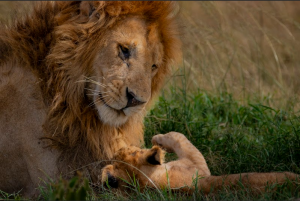
Too Wild Co-Founders Highlight Wildlife Filmmaking's Impact for World Wildlife Conservation Day
Wildlife filmmakers Lauren Arthur and David Eastaugh emphasize the role of film in raising conservation awareness.
As biodiversity loss reaches a critical point—with over one million species at risk of extinction according to the Intergovernmental Science-Policy Platform on Biodiversity and Ecosystem Services (IPBES)—Arthur and Eastaugh see storytelling as a way to bridge the gap between people and the natural world. “Conservation begins with connection,” says Arthur. “Our films bring viewers into wildlife habitats, showing what’s at stake. On World Wildlife Conservation Day, we hope to inspire others to be a part of the solution.”
Meet the Minds Behind Too Wild
Lauren Arthur, a dedicated conservationist with a BSc in Zoology and an MSc in Marine Biology, has presented live for WildEarth across Africa and has been featured on National Geographic, Nat Geo Wild, SABC, CGTN, and Disney+. Known for her passion for storytelling, Arthur leverages her science background to educate and engage viewers through a creative lens. “It’s not just about capturing beautiful images,” says Arthur. “It’s about using those images to make people care.”
David Eastaugh, head of camera for Too Wild, brings a love for technology and innovation to his role, capturing wildlife in unique and powerful ways. Eastaugh has worked with BBC, Disney+, National Geographic, Nat Geo Wild, and the WWF, known for his adventurous spirit and commitment to finding new ways to bring the natural world closer to viewers. “Through the camera lens, I want people to feel the vastness and serenity of these habitats, to feel as though they’re having a conversation with nature,” says Eastaugh.
Wildlife Filmmaking as a Conservation Catalyst
Wildlife documentaries have a profound impact on public awareness and conservation engagement. According to the Wildlife Conservation Society, visual storytelling is an effective tool for inspiring action, and research from National Geographic shows that documentaries can increase viewers’ commitment to conservation by up to 40%. With Too Wild’s filmmaking course, Arthur and Eastaugh are nurturing a new generation of wildlife storytellers, empowering them to share conservation messages through film.
“Storytelling can drive meaningful change,” Arthur notes. “Through our course, we teach filmmakers to connect their audience to wildlife in ways that resonate emotionally and motivate action. The more people feel connected, the more likely they are to protect.”
A Global Call to Action for World Wildlife Conservation Day
World Wildlife Conservation Day, recognized by the U.S. Department of State, is a call for collective conservation efforts. Too Wild encourages everyone to celebrate the day by learning more about the planet’s ecosystems, taking small conservation actions, and recognizing the power of media in promoting change.
About Lauren Arthur and David Eastaugh
Lauren Arthur and David Eastaugh are wildlife filmmakers and co-founders of Too Wild. Arthur, a zoologist and marine biologist, and Eastaugh, an experienced wildlife cameraman, share a passion for conservation storytelling and have worked with major networks to bring wildlife stories to the global stage. Together, they lead a wildlife filmmaking course to inspire a new wave of conservation-focused filmmakers.
For more information about World Wildlife Conservation Day and to learn more about the impactful work of Too Wild, please contact Stefanie Magness at Elevate U PR at stefanie@elevateupr.com.
Lauren Arthur
Too Wild
+27 66 388 6443
email us here
Visit us on social media:
Instagram
YouTube
TikTok
Distribution channels: Culture, Society & Lifestyle, Education, Environment, Travel & Tourism Industry, World & Regional
Legal Disclaimer:
EIN Presswire provides this news content "as is" without warranty of any kind. We do not accept any responsibility or liability for the accuracy, content, images, videos, licenses, completeness, legality, or reliability of the information contained in this article. If you have any complaints or copyright issues related to this article, kindly contact the author above.
Submit your press release


